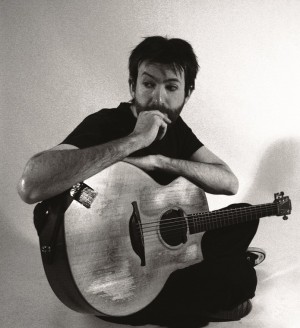One-Man Symphony: Jon Gomm
GALO: What soul artists were you a fan of? Did you dig Amy Winehouse?
JG: My wife is a big fan of Amy Winehouse. She is also a musician and my manager as well. I had a lot of respect for her as a songwriter, but it wasn’t something I would regularly listen to. But I do know a couple of guys in her band (the horn section) because they’re from Leeds where I live. It’s very sad because she was not the first casualty of that band. One of the sax players, Jason, died of an overdose a couple of years earlier. It’s very, very sad, but heroin addiction is not restricted to famous musicians — that’s for sure.
GALO: I think it’s awesome that an artist of your talents is ignoring the major labels.
JG: When I was younger, and all through my life, a lot of the music I’ve listened to has been stuff that nobody has heard of. You can be a musician and not be a superstar. You can be a working musician (that can be your job) and that’s all I ever wanted. I never wanted to be famous; that was completely not a part of why I made music. For me, I don’t feel like I’m missing out on anything by not signing with a major label because it’s not something that really interests me.
It’s strange, because in most professions, there is no option for that. You can’t suddenly say, “OK I’m going to try to take this to the next level and be a world famous dental hygienist.” [Laughs] People think it’s strange because I’m a musician, but to me, maybe it’s the music industry which is very strange and the world is full of ordinary people doing their jobs and that’s what I am, but because I’m a musician, it seems odd.
I’m also very lucky. I live in an age where I can make my own CDs and record an album in my house because I can buy a laptop and some microphones that are good, but not that expensive. I can market it on the Internet. I can sell downloads; I can put videos on YouTube. I don’t need to send my video to the label so they can try to get it on MTV. I’ve tried to capitalize on the Internet in a creative way. I think the music industry is really missing the huge important bits that the Internet can do for music. Especially for popular styles of music, I think the mainstream music industry is kind of finished, but we’ll see.
I’ve spent my life, my whole life, practicing and learning so much; it’s an academic process. It’s something a lot of kids have to learn. If you get to a certain stage and think you’re good enough, whatever that means, then you’ve got it wrong. Or if you play just one style of music, you’ve got it wrong, unless you’ve invented that style of music, then you’re not doing anything worthwhile. Try to broaden your horizons and keep learning, keep learning.
GALO: When composing, do you record your ideas, or write things down?
JG: Usually, I write in my head. So, quite often, I’ll have the whole song or a good chunk of the song. Depending on the structure of the song, maybe I’ll have a verse and a chorus. Maybe I’ll write down the words, and sometimes, I’ll write down the melody as well. Sometimes, I think in styles of music, so I think this song will be a blues genre, or I might think I want this song to be kind of rock, or I might want it to sound like a particular artist, or mixed with another artist, or sound like a particular song. Not like the actual words and notes of the song, but if I like the sound of a song, I’m going to try and capture that on acoustic guitar. I’ll sit down and take the song that I’ve written in my head and take the idea for the mood or genre, and try and create that with the guitar arrangements. It can take me months to write the song with that process. Because over a period of time the song will gradually evolve, and then I’ll start playing it live and it will evolve some more, because in front of an audience, you realize what things work and what things don’t. And it’s not about the audiences’ reaction, it’s about how you feel when you play the song, and whether you’re communicating what you intended to communicate.
I want to communicate ideas because that’s what excites people. You have to give them something to get. If you just present it on a plate, there’s nothing to get. If you create layers of metaphor within lyrics and then place the music in a certain way, which can reveal ideas in the lyrics, the music can then hint at what the lyrics are trying to say, [and] it all becomes a coherent whole. The audience can unravel it in their mind. So, it’s like the way you get a joke. Because, there’s a layer of understanding that, you have to have.
(Article continued on next page)

